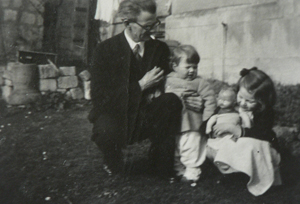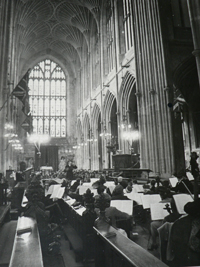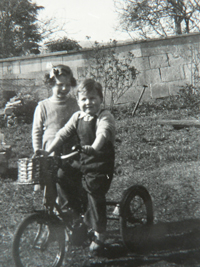Julien Chilcott-Monk
Bath - 1946 to 1951
It is often difficult to discriminate between what you remember about your early years and what you have been told that you remember. There are a number of things, however, which have always remained firmly in my memory and in respect of which I have never needed a reminder. One, most certainly, is the memory of the layout of 39, Sydney Buildings, the house in which I spent my first five or so years. Number 39 was solely the ground floor of the premises (or lower ground floor when viewed from the front of the house) overlooking the rear garden, as the upper floors comprised 39a Sydney Buildings. This memory was tested, resulting in no real surprises although many modifications have been made over the years, when I returned 56 years later. Nothing, however, seemed smaller and this did, perhaps, surprise me.

Julien with his father and sister in the back garden of No 39
Another memory is that of the regular visits of the baker, who called (I cannot remember the days of the week) armed with a huge basket on his arm and exchanged merry banter with my sister and with me. I recall the price of a small brown loaf as fivepence farthing, and I remember, I think, my father’s outrage at the increase in the price of a penny bun to five farthings. But the baker was a jolly fellow and my father would not have been cross with him. I cannot remember his name or the name of the firm.
The vast copper gas geyser above the bath looking for all the world like something from a prototype submarine, was a formidable machine out of which issued horizontal flames about two feet long, when fired up just before bathtime. This hazardous beast has, mercifully, been laid to rest.
I used to enjoy the delivery of coal disgorged from a sack through a lid in the pavement and down into the cellar beneath. I was admonished on one occasion for opening the door to the cellar in order to experience the thrill of the cloud of black dust.
UpI remember few names – never a strongpoint of mine – except that a Miss Chaddock and her brother lived at number 39a. Mr and Mrs Nancarrow (I imagine that the spelling) were obviously acquaintances of my parents because they always passed a few words with them when out and about and usually presented us children with a wrapped boiled sweet each from the depths of a warm pocket. The cellophane was always difficult to remove as a consequence of the warm pocket. Sweets were not plentiful and were still rationed at the time along with all products of sugar. The local taxi driver was one, Mr Lyon, I believe. Mr Stickler, of course, was the greengrocer around the corner in Bathwick Hill. The priest at St John the Baptist’s, where my father was organist, was a Father Cooper; the family physician was Dr Lynn, the father of the Hollywood director and one time actor in the television series Doctor in the House, Jonathan Lynn.
Of course I remember the names of the three maiden sisters, who owned and ‘ran’ ffellowes school at The Hollies, Widcombe Hill (now, simply, No. 6, Cambridge Place, the name having been expunged from the front right pillar, I understand, in the 1970s). They were the Misses Norris, but the daily walk to and fro their establishment I recall only vaguely. I certainly had not remembered how steep was Abbey View. I have an early report from this school to this day.
My father and mother moved into number 39 in April 1941 having been fire-bombed out of No. 7 Burlington Street during the weekend of the blitz. He was a peripatetic music master, taught at Kingswood and Monkton Combe, had founded the Bath Philharmonic Orchestra and then reformed the orchestra into the Bath Symphony Orchestra (50/50 amateur and professional players), which still flourishes. Programmes from the orchestral concerts were a great delight to us for some reason or other. I do not recall why they were of such interest, neither do I remember how we played with them.

Ernest A Monk conducting at the Bath Abby
I think life largely centred on music and church. Many musicians called and were entertained – the composer Frank Tapp was a frequent visitor. Sir Sydney Nicholson paid a visit on one occasion. Probably many of the soloists employed to play with the BSO called and discussed the scores – among others, Miss Michal Hambourg, Henry Holst, Miss Valerie Lubke and Zacharawitz, to name only four.
UpBy far the most memorable event in my early life was born of a musical occasion. That occasion was my ‘conducting’ my father’s playing over a musical score on the grand piano in preparation for his conducting performance that evening. The piece was, I was later reminded, the prelude to Act 1 of Die Meistersingers. I sat, or had been seated, on the window sill opposite the tail of the piano looking up to the pianist, who always had the score flat on the unerected music desk. Now the window behind me was open to the fullest extent, the lower sash having been pushed up as far as possible behind the upper sash. Oblivious or careless of this emergency exit, I entered with great enthusiasm into the delights of this prelude, with the jaunty rhythm hammered out, in orchestral performance, by the tympani, and so on. Arms were flapping about in the best traditions of the worst conductors. Thrusting my arms forward to ensure that my father wrung the last nuance out of a particular cadence, I then leaned back to enjoy the effect of my powerful control over my father’s playing, and I vanished from his view falling six feet or so to the stone slabs of the veranda below.
I wonder if it was with some relief that the conductor had disappeared allowing the performer free rein and uninhibited access to his own interpretation; I wonder if my father even noticed my absence at first. Perhaps the room had become a little lighter.
My next memory is of my lying – painlessly – on my back with vast numbers of people poring over me with anxious peering faces. In practice there can have been only three such faces – my eight-year-old sister, my mother and, eventually, my father.

An older Julien with his sister in the back garden
I remember my father asking my mother how I was and I remember well her reply: 'Oh I think he’s all right; I shall give him an egg for tea.' And so I was and so she did.
Julien Chilcott-Monk
June 2008
Sydney Buildings History Group ©
UpBack